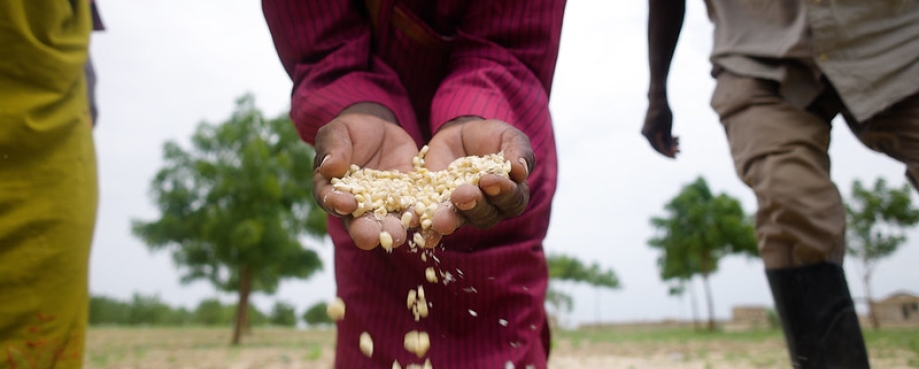
Agriculture is both a major contributor to climate change and highly vulnerable to its impacts. As global food companies push for “sustainable” or “regenerative” practices, there’s a critical question we must ask: Will this be a just transition for the workers who feed the world?
After the energy sector, agriculture is the largest contributor to global greenhouse gas emissions – accounting for roughly 12%. At the same time, agriculture, and the food system more generally, are highly vulnerable to rising temperatures and climate volatility. In the UK alone, 2024 brought the wettest 18-month period on record. Now, in 2025, UK farmers are facing a high risk of drought after the driest spring in more than a century. Similarly, in other parts of the world, farmers are facing unpredictable weather patterns and extreme climatic events. Cocoa producers in West Africa are struggling with high temperatures and unpredictable rains.Torrential rain and unprecedented flash flooding destroyed crops and livelihoods in Spain’s agricultural heartland in October 2024.
A new hope?
In order to both improve agricultural resilience to the changing climate and to strengthen carbon sequestration potential in the landscape and soil, many global food companies are investing in innovative approaches to agriculture. For example, Nestle, the world’s largest food company, aims for 50% of its “key ingredients” to be sourced from farmers adopting regenerative agriculture practices by 2030. Meanwhile, Cargill – one of the world’s largest grain producers and traders – aims to provide training on sustainable agriculture to 10 million farmers by 2030. And Unilever has committed to a “new Regenerative Agriculture Code” for all its suppliers.
Terms like “regenerative agriculture”, “nature friendly farming”, “sustainable agriculture” abound. Look closely and you might spot a faintly glowing green halo hovering above each one.
As a tripartite organisation focused on advancing human rights in supply chains, ETI is not in a position to assess the climate adaptive and mitigation potential of these different approaches, but one aspect that strikes us as missing from all the excitement about this agricultural transition is a consideration of who’s doing the work.
Let’s be clear: agricultural workers feed the world. And in many regions, agriculture is one of the largest employers. In Kenya, agriculture employs around 32% of the workforce, in South Africa it’s 19%, in Peru 24%, and in India 44% (World Bank); all countries that UK consumers are accustomed to seeing on food labels at their local supermarket. But when workers’ voices, priorities and knowledge are not part of decision-making, sustainability plans are likely to repeat the same human rights risks that have long plagued agricultural supply chains.
New research to understand human impacts and identify good practices
In early 2025, Ethical Trading Initiative, the International Institute for Environment and Development (IIED) and Banana Link launched a new collaborative research project that aims to answer key questions, including:
- Where sustainable agriculture (broadly defined) is being implemented on production sites integrated into global value chains, what are the human rights impacts for workers and producers?
- How do these impacts differ from those found on sites practising conventional agriculture?
- Are there existing good practices that bring workers into decision making about transitions to sustainable agriculture (including via trade unions and worker organisations)?
We’ve begun with desk-based research to explore these questions, including a rapid evidence review, interviews with experts working in this sector, and a session with ETI members to sense-check initial findings and identify further areas to explore. Later this month, during London Climate Action Week, we’ll host a roundtable bringing together experts from across industry, academia, civil society and trade unions to dive deeper into findings, reflect on their implications and develop a roadmap for the next stage of research.
Why it matters – a Just Transition
Just transition is not only about greener practices - it’s about fairness, inclusion, and human rights. The ILO has defined just transition as “greening the economy in a way that is as fair and inclusive as possible to everyone concerned, creating decent work opportunities and leaving no one behind”.
But just transitions are as much about the process as the outcome: workers and their representatives must be part of the decision making and not passive recipients of the change. As a tripartite organisation, with members and a governance board that includes companies, NGOs and trade unions, this focus on social dialogue is central to our work on just transitions.
Agricultural labour has long been associated with exploitative practices. From state-imposed forced labour in tomato production, to widespread sexual violence and harassment of women workers in the tea sector, to child labour in cocoa, forced labour in coffee, and exploitation of migrant workers on UK farms – the record is simply not good enough.
Let’s not rebuild a flawed system with a new green façade
A more climate-resilient and environmentally-sound food system is essential. But if workers’ rights are not integrated into the heart of this transition, we risk rebuilding a flawed system with a greener façade.
As the movement towards sustainable agriculture gains momentum and begins to scale, it is essential that we understand what is required to ensure workers’ fundamental human rights are respected. Only when this is at the centre will this agricultural transition be a just one.
Do get in touch if you are interested to join our roundtable discussion later this month.
This blog was originally published by the International Institute for Environment and Development (IIED).
